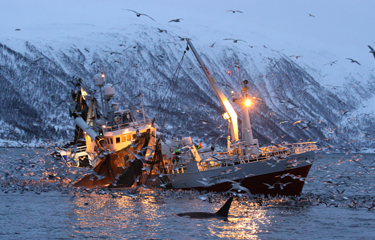Consultations between the European Union, the Northeast Atlantic coastal states, the United Kingdom, and Norway have concluded, with the parties reaching agreements for the shared management of key commercial fish stocks in 2023 that bring them back into line with International Council for the Exploration of the Sea (ICES) scientific advice.
The agreement between the E.U. and the coastal states covers the joint management of mackerel, blue whiting, and Atlanto-Scandian herring stocks. For mackerel, a total allowable catch (TAC) of 782,066 metric tons (MT) was set for next year, with the agreed volume representing a 2 percent decrease on 2022’s TAC. This is in line with the maximum sustainable yield (MSY) approach advised by ICES.
For 2023, the blue whiting TAC was set at 1,359,629 MT, an 81 percent increase on this year, while for Atlanto-Scandian herring the TAC is down 15 percent year-on-year to 511,171 MT. Both TACs are in line with the ICES advice, and in accordance with the long-term management strategy (LTMS) approach.
The European Commission reported that all parties “recognized the need to reach a consensus on quota-sharing arrangements for all three stocks as soon as possible.”
Atlanto-Scandian herring and blue whiting both had Marine Stewardship Council certification suspended in 2020, due to the fishing TACs being out of line with ICES advice. Both the MSC and the Northeast Atlantic Pelagic Advisory group urged stock managers to take “tangible action” on the sustainable management of the stocks ahead of 2022’s meetings.
Companies in the region also demanded the various governments reach agreements that would bring the stocks back into line with ICES advice, with the U.K.’s largest processor warning in 2021 it would stop purchasing from the fisheries if they continued to be fished to excess. Buyers also advocated for cuts to the Northeast Atlantic quotas for Northeast pelagic stocks, to bring them into line with scientific advice.
Now, with the agreements back in line with advice, the E.U., Norway, the Faroe Islands, the United Kingdom, and, for the first time, Iceland and Greenland, have also agreed to set control measures for pelagic stocks no later than 2026.
“This represents a significant step forward towards creating a level playing field for all fleets and improved management of joint stocks in the Northeast Atlantic,” the commission said.
Additionally, an agreement was reached between the E.U., U.K., and Norway on the joint trilateral management of six key stocks in the North Sea – cod, haddock, saithe, whiting, plaice, and herring.
Cumulatively, this agreement provides over 300,000 MT of fishing opportunities for E.U. fleets for these stocks in 2023, the commission advised, with the TACs for cod, herring, plaice, and saithe set in line with the advised MSY level.
“For haddock and whiting, the agreement shows restraint with an increase of 30 percent for each TAC,” it said.
Bilateral fisheries consultations with Norway and the U.K. are still ongoing.
Earlier in December, the E.U. Council of Fisheries Ministers agreed on 2023 fishing opportunities for the fish stocks exclusively managed by the E.U. in the Atlantic Ocean, Kattegat, and Skagerrak, including deep-sea stocks for 2023 and 2024.
Fisheries ministers also agreed on next year’s fishing opportunities for the Mediterranean and the Black Sea, with the new arrangements including a 7 percent reduction of the trawling fishing effort, and catch limits for deep-water shrimp in the Strait of Sicily, the Ionian Sea, and the Levant Sea.
Photo courtesy of Alessandro De Maddalena/Shutterstock







